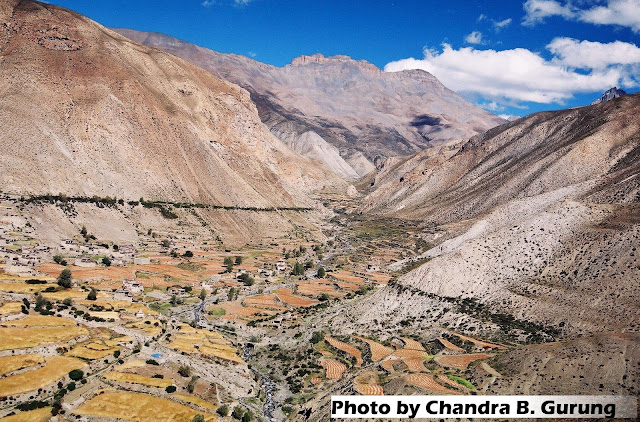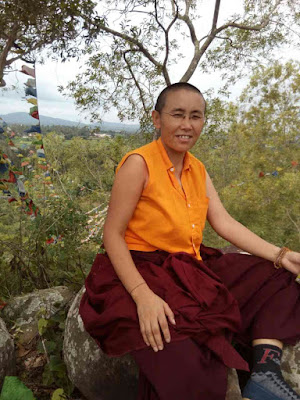"if I could practice Dharma properly...": The Lopon #Nun from #Dolpo and her #Experiences. #Gender #Interview #Migration #Education
I was amazed and curious when I saw one of my friends posting her picture in wechat. I saw a woman-nun teaching a group of another women. I have rarely seen such activity though I am sort of aware of this fact in any nun Monastery. Her origin in Dolpo also added mine pursuit. Once I saw her picture, I instantly asked my friend, Wangdrak, "who is she?" and he said: "She is my sister, who is the First Lopon of Dolpo. Her name is Nisher Bhumchok and she is now in Inda". This further made me anxious over why she chose to spend her life in India than in her village and why she became a Nun. As she is now in India, it was little hard to communicate directly with her but with Wangdrak support, I am glad that I somewhat succeeded to complete this brief interview with her. This short conversation including her reply will definitely shed some lights over the situation of girls and women of Dolpo.
Pic: Nisher Bhumchok Lopon La
My last 2-3 years interest in this broader theme of Gender and its sub-themes including sisterhood, homogeneity, heteronormativity, gender justice, gender relations, women experiences, masculinity, intersectionality and many others, also pushed me to dwell further into this conversation. On the other hand, it is always hard to read to know the life history including the experiences of those women who are from the distant region. In our case of Dolpo community and overall Himalayan region, the proper documentation of such women's experiences and perspectives are rarely understood well. My interview with her is also one of those many reasons where I have further tried to learn more about this community, Dolpo and the plight of this community's women and their 'enlightening' experiences.
NB: I am from Vijer, Dolpo, Nepal. I was born on April 1973. My parents name are Tenzin Nyima and Karma Wangmo.
2. What was some of the social problems you could remember when you were in your village, Dolpo?
NB: I remember those days when I was in my village, Dolpo, there was a great problem of electricity. We rarely saw any lights. In addition, during winter, cold affected us a lot because my village is very remote place and it is at the hill station. The winter nearly makes the livelihood impossible in the village. And on Spring and Autumn, I remember doing lots of work. All the farm works had to be done at that time. Besides, I miss the love and care of my parents poured me. I still regret for not being able to repay the kind of my parents. But still at that same time, I feel if I could practice Dharma properly, then may be I could repay my parents and my Root Guru's Kindness.
3. How do you see the situation of women in Vijer?
NB: What I think about my village sisters is, in my village, it is very rare to get a girls to be educated. Above all, it is really rare and difficult to get girls to get a chance to practice Dharma. On Winter season, most of boys reside in strict Retreat practice and do not come out till it over. At that time, it is women who has to look after one's house and all the livestock and farming.
4. What forced you to leave your village and go to India? Which year and how old were you when you went to India?
NB: I left my home because if I have stayed working or farming like that, then I could not have been able to study about supreme Dharma and I would have been able to think about other's benefit. Unless oneself and also when I was little, my father used to tell me the life stories of the great Yogis and Dakinis, which also inspired me to be a nun. Therefore, I left my home.
I have been a nun since 1996. I was only 23 years old when I came in India. Hence, I have been practicing Dharma for 20 years.
5. Why you chose to become a Nun and later a Lopon? What a Lopon can do but not by a nun? Any difference between the activities and rituals of Nun and Lopon?
NB: As you have asked about the differences of Lopon and Nun, actually Lopon means a teacher and we are all nuns whether we are teachers or students. But we receive the name of Lopon after we finish our nine years of course here.

6. What do you enjoy most yet still upset about in India?
NB: My happiest moment is when I could make others happy, I feel better. And when my student could not understand what I taught, at that time I feel very disappointed and I feel bad when my health gets poor.

7. Do you still miss your village? Why? Where are your parents and brothers and sisters if any? What are they doing?
NB: I do not really miss my homeland because I do not have any reason to. I have no parents now to miss, not my teacher who could lead me in my right path. (She lost her parents before 20 years ago). Therefore, I have no reason to remember my village in return back. I have one little brother who is an Thangka Artist and I have one sister who is already married and has a children.
Pic: Lopon la's sister, Pasang Bhuti, with her children (at the left) and her mother (at the right)
Pic: Born in Vijer, Dolpo, and raised in Sikkim, India, Lopon's brother, Tenzing Wangdrak is a rising Thangaka Artist and a good friend from Vijer, Dolpo.
8. What are the problems that are faced by women in Vijer will she help to solve? How?
NB: What most difficult for my village Vijer girls are, they are not getting chance to study. and I wish to benefit them with little education of Buddhist introduction and Buddhist Philosophy.

Pic: Vijer, Dolpo.
Note: Her brother Tenzing Wangdrak is reacheable in tenzingartist@gmail.com. His phone number is 9816913883.








Comments
Post a Comment